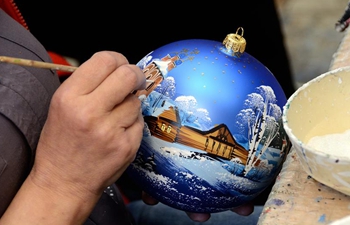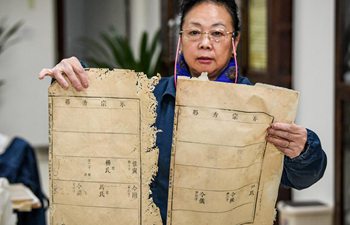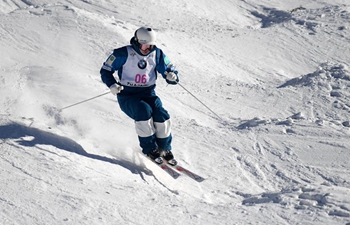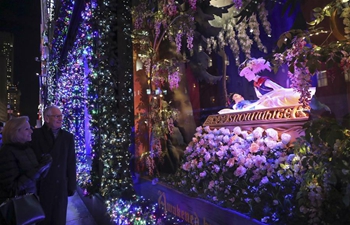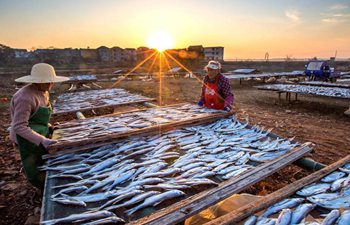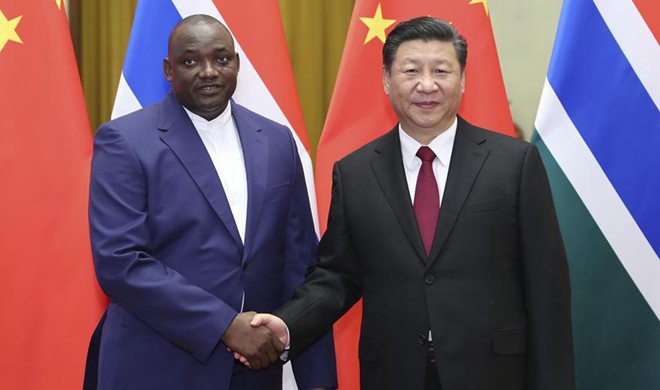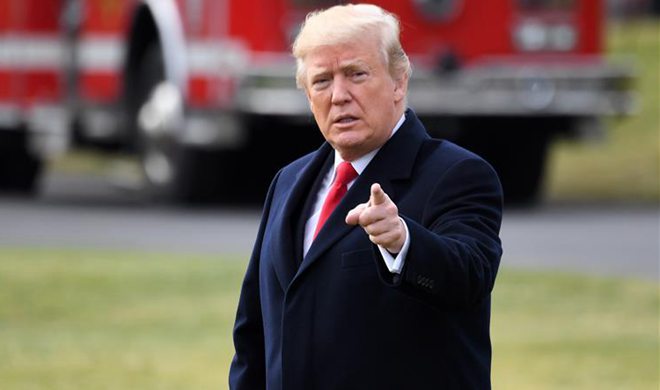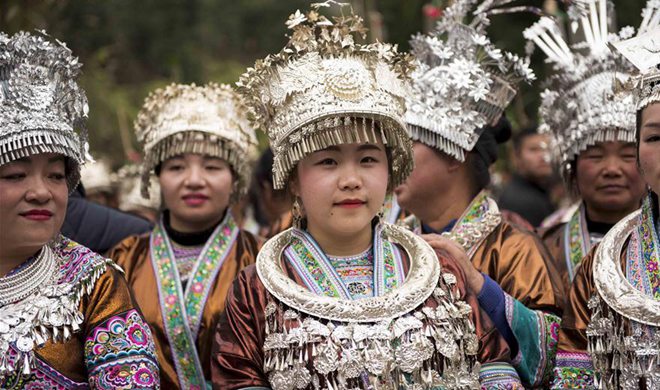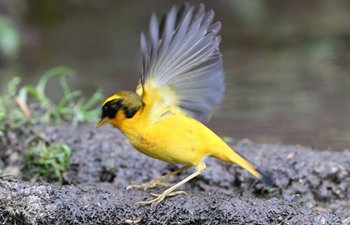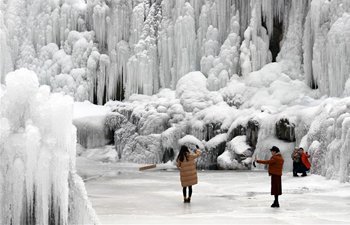BEIJING, Dec. 23 (Xinhua) -- With PyeongChang 2018 only two months away, the Olympic Winter Games will enter "Beijing Time" shortly.
The Beijing 2022 Organizing Committee has made solid progress in its preparations for a "remarkable, extraordinary and excellent" Olympic Winter Games in the year of 2017 by unveiling official emblems, launching marketing program and starting the constructions of all the venues.
As the most important image of the Games, the emblems of the Beijing 2022 Olympic and Paralympic Winter Games, respectively named "Winter Dream" and "Flying High," were unveiled on December 15.
These emblems have again left a Chinese mark in the history of the Olympic and Paralympic Games, following Beijing 2008 and Nanjing 2014. The International Olympic Committee (IOC) president Thomas Bach said via video at the launching ceremony that the Olympic emblem is a symbol of both "ambitions and dreams."
The general public is currently able to get their hands on merchandise carrying the new logos. The organizers of Beijing 2022 have started test operations for the sale of franchised products, and China Post will publish a commemorative stamp on December 31. Franchised products of Beijing 2022 are on offer from an online store starting on December 16.
Beijing 2022 marked another important milestone with the launch of its official marketing program in February. As China already announced an ambitious plan to involve 300 million people in winter sports, especially among young people, and also aims at speeding up development of the Beijing-Tianjin-Hebei region, the marketing program has a solid platform.
Bank of China became the official banking partner, the first official partner, of Beijing 2022 in June. Earlier in January, China's Alibaba Group already made a long-term commitment to the IOC through 2028 by becoming Worldwide Olympic Partner.
Timo Lumme, Managing Director of IOC Television and Marketing Services, said: "Chinese businesses and brands are known around the world, and what happens here has ripple effects across the planet."
Through a strong focus on sustainability and legacy, Beijing 2022 has embraced the spirit of Olympic Agenda 2020, the strategic roadmap for the future of the Olympic Movement. The venues from Beijing 2008 such as the Capital Indoor Stadium, Wukesong Arena and the National Aquatic Center, will be repurposed for the Olympic Winter Games.
For instance, the National Aquatic Center, dubbed the "Water Cube" which staged the swimming events during the Beijing 2008 Games, will be transformed into an ice rink for curling games in 2022.
Besides, the Shougang Industry Park, which is a former steel mill that was closed down in 2008 ahead of the Olympic Games, is now the location of the Organizing Committee's headquarters and will be the location for Big Air in 2022.
Alongside the Big Air venue, the Shougang Industrial Park is also being redeveloped as an ambitious mixed development, which will include housing, leisure facilities, sports facilities and office space.
The IOC's Coordination Commission was pleased to see advancements made to these sustainability and legacy plans during its second trip to China in June.
"Since our last visit, the Beijing 2022 Organizing Committee has made good progress in its preparations for sustainable Olympic Winter Games that will benefit the city, region and country for decades to come," Commission Chair Alexander Zhukov said after the review.
All of the venues of Beijing 2022 are under construction in its three competition zones this year, namely Beijing, Yanqing and Zhangjiakou. According to the organizers, all of the main work of newly-built competition venues will be completed in 2019 and will be ready for test events in 2020.
At Beijing competition zone, the National Speed Skating Oval's construction has already begun. The venue sits in the Olympic Forest Park next to the Beijing 2008 tennis facility.
At Yanqing competition zone, the course for Alpine Skiing is being cleaned and the design of the bobsleigh, skeleton and luge tracks have been certificated by International Bobsleigh & Skeleton Federation. At Zhangjiakou competition zone, the construction of snowboarding, freestyle skiing, cross country skiing, ski jumping, nordic combined and biathlon are also underway.
Beijing has promised the world with athlete-centered, sustainable and economical Winter Olympic Games during the bidding process, under the theme of which, the Athletes'Commission was established to better reflect athletes' opinion and serve the athletes of all over the world. Yang Yang, Chinese first Winter Olympic champion and member of IOC, became chairwoman of the Athletes'Commission.
The Organizing Committee finished its first worldwide recruitment for talents in June. A total of 30 staff members were recruited for 21 positions. Positions in this recruitment involve majors in planning and construction, venue management, marketing, media, finance, law and foreign languages.
The organizers also have very good contacts with international winter sports federations as it's important to get the best expertise and specialist from all over the world.
Beijing and Zhangjiakou also held some worldwide winter sports events such as the World Women's Curling Championships and the Snowboard World Cup.
The president of World Curling Federation (WCF) Kate Caithness praised the Chinese organizers did "first-class job" in hosting the World Women's Curling Championships 2017.
Caithness had visited the "Water Cube". She spoke highly of the transformation from "Water Cube" to "Curling Cube" .
"We all speak of the legacy of Olympics and Paralympics and this is a great legacy. It's an iconic building in Beijing and they have used it for so many events. To be able to use the same building and transform into winter sports must be one of the first time in history. From swimming pool to a curling rink is very exciting," Caithness said.




